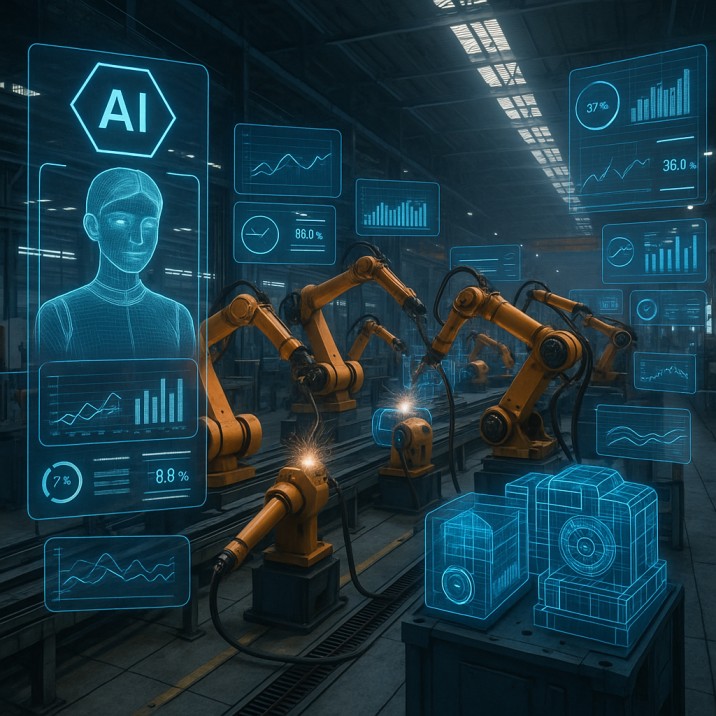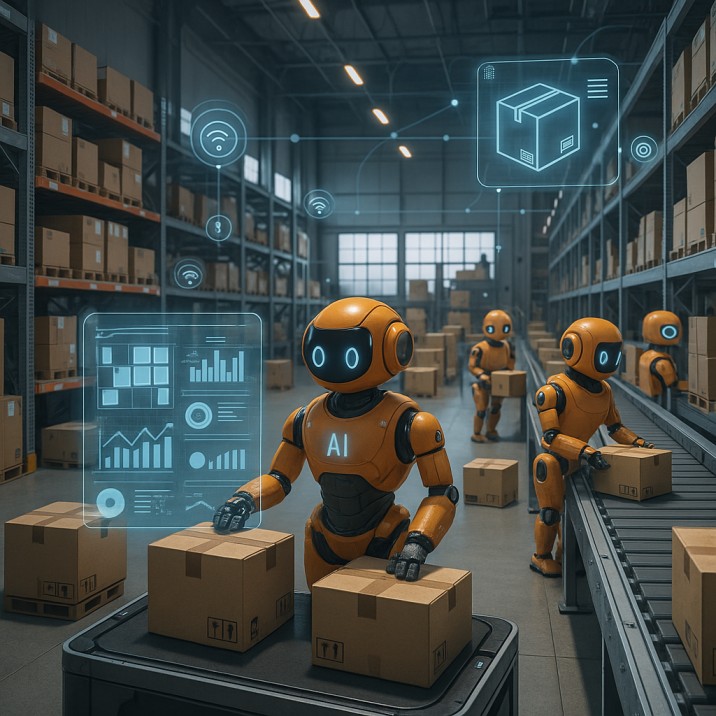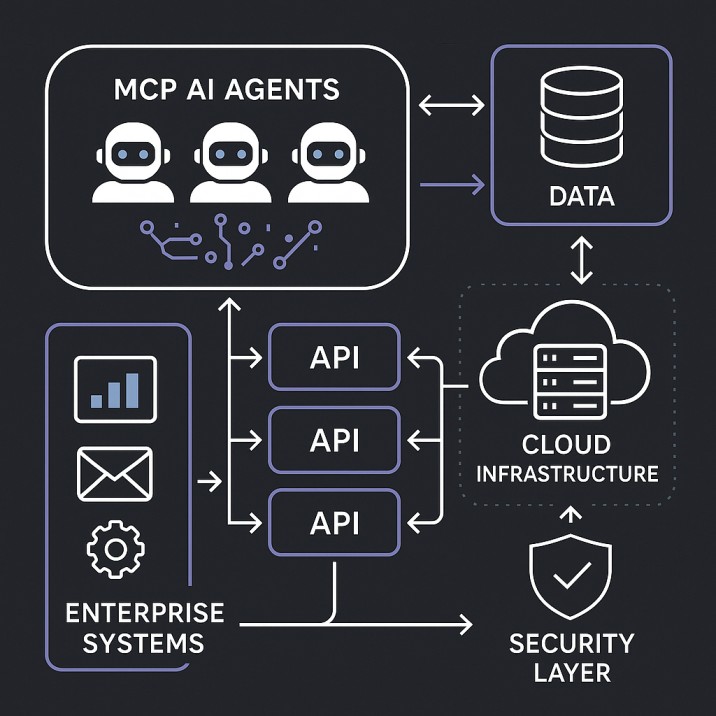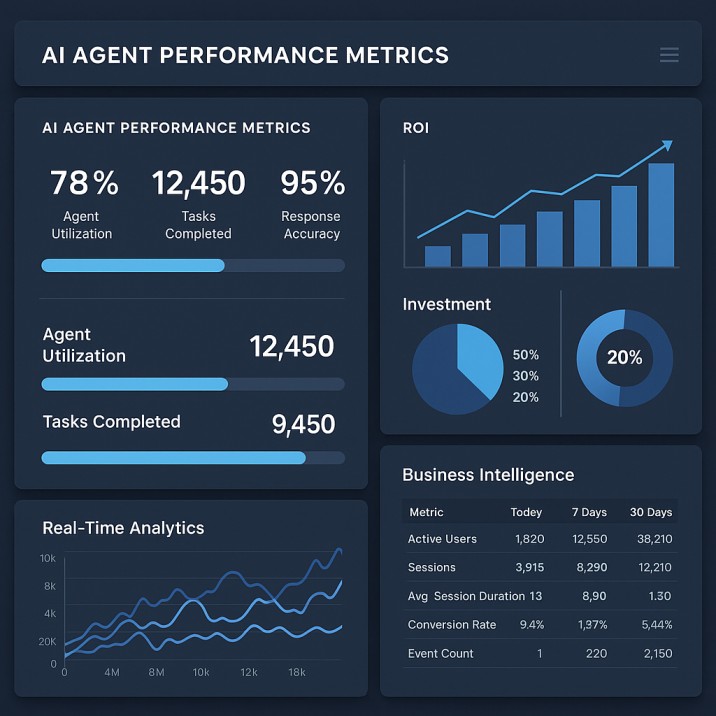The workplace is undergoing a fundamental transformation as MCP AI agents emerge as the cornerstone of next-generation business operations. These sophisticated multi-agent systems are not just automating routine tasks—they're redefining entire industry landscapes through intelligent collaboration, scalable decision-making, and unprecedented operational efficiency.
As organizations worldwide grapple with increasing complexity and the demand for faster, more accurate business processes, MCP (Multi-Agent Coordination Protocol) AI agents represent a paradigm shift from traditional automation to intelligent, adaptive systems that can think, learn, and collaborate at scale.
Understanding MCP AI Agents: The Foundation of Tomorrow's Workforce
MCP AI agents are sophisticated artificial intelligence systems designed to operate collaboratively within multi-agent environments. Unlike single-purpose AI tools, these agents can communicate, coordinate, and collectively solve complex problems that would be impossible for individual systems to handle efficiently.
Core Characteristics of MCP AI Agents
- Autonomous Operation: Agents can make decisions independently based on their programming and learned experiences
- Inter-Agent Communication: Seamless information sharing and coordination between multiple agents
- Scalable Architecture: Systems can grow and adapt to handle increasing complexity and workload
- Context Awareness: Agents understand their environment and can adapt their behavior accordingly
- Learning Capabilities: Continuous improvement through machine learning and experience
The MCP server architecture provides the foundation for these capabilities, enabling organizations to deploy and manage complex AI agent networks with unprecedented efficiency.
Industry-Specific Transformations Through MCP AI Agents
Manufacturing and Industrial Operations
In manufacturing, MCP AI agents are revolutionizing production lines through predictive maintenance, quality control, and supply chain optimization. These systems can monitor equipment health in real-time, predict failures before they occur, and automatically adjust production parameters to maintain optimal efficiency.
Key Applications:
- Predictive maintenance scheduling that reduces downtime by up to 45%
- Quality control systems that achieve 99.7% accuracy in defect detection
- Supply chain optimization that cuts inventory costs by 20-30%
- Energy management systems that reduce consumption by 15-25%

Healthcare and Medical Services
Healthcare organizations are leveraging MCP AI agents to enhance patient care, streamline administrative processes, and accelerate medical research. These systems can analyze vast amounts of medical data, assist in diagnosis, and coordinate care across multiple departments.
The implementation of vertical AI agents in healthcare has shown remarkable results in specialized medical fields, from radiology to surgical planning.
Healthcare Transformations:
- Diagnostic accuracy improvements of 15-20% in medical imaging
- Administrative task automation reducing staff workload by 40%
- Drug discovery acceleration through collaborative research agents
- Patient monitoring systems that predict health complications 72 hours in advance
Financial Services and Banking
The financial industry has embraced MCP AI agents for fraud detection, risk assessment, algorithmic trading, and customer service optimization. These systems can process millions of transactions simultaneously while maintaining compliance with regulatory requirements.
Financial Sector Applications:
- Fraud detection systems with 99.5% accuracy and sub-second response times
- Risk assessment models that analyze 10,000+ variables simultaneously
- Automated compliance monitoring across multiple regulatory frameworks
- Customer service agents handling 80% of inquiries without human intervention
Retail and E-commerce
Retail organizations are using MCP AI agents to personalize customer experiences, optimize inventory management, and streamline supply chain operations. These systems can predict consumer behavior, manage pricing strategies, and coordinate logistics across multiple channels.

The Technical Architecture Behind MCP AI Agent Systems
Multi-Agent Coordination Protocols
The success of MCP AI agents depends on sophisticated coordination protocols that enable seamless communication and collaboration between multiple autonomous systems. These protocols define how agents share information, negotiate tasks, and resolve conflicts.
Core Protocol Components:
- Message Passing Systems: Standardized communication protocols for agent-to-agent information exchange
- Task Allocation Algorithms: Intelligent distribution of work based on agent capabilities and availability
- Conflict Resolution Mechanisms: Automated systems for resolving competing objectives between agents
- Performance Monitoring: Real-time tracking of agent performance and system health
Scalability and Infrastructure Requirements
Implementing MCP AI agents requires robust infrastructure that can support massive parallel processing, real-time data exchange, and continuous learning. Organizations must consider cloud architecture, edge computing, and hybrid deployment models.
| Infrastructure Component | Requirements | Scaling Considerations |
|---|---|---|
| Computing Power | High-performance GPUs/TPUs | Auto-scaling based on workload |
| Data Storage | Distributed databases | Horizontal scaling with replication |
| Network Bandwidth | High-speed, low-latency connections | Load balancing and content delivery |
| Security | End-to-end encryption | Distributed security protocols |
Implementation Strategies for MCP AI Agent Systems
Assessment and Planning Phase
Successful implementation of MCP AI agents requires comprehensive planning and assessment. Organizations must evaluate their current infrastructure, identify use cases, and develop a roadmap for gradual deployment.
Key Assessment Areas:
- Current automation maturity and existing AI capabilities
- Data quality and availability for training agent systems
- Infrastructure capacity and scalability requirements
- Regulatory compliance and security considerations
- Change management and workforce training needs
Understanding how to build AI agents from scratch provides valuable insights into the technical requirements and challenges involved in implementation.
Pilot Program Development
Organizations should start with targeted pilot programs that demonstrate clear value while minimizing risk. These pilots should focus on specific use cases where MCP AI agents can deliver measurable improvements.
Pilot Program Best Practices:
- Select use cases with clear ROI metrics and success criteria
- Start with low-risk, high-impact applications
- Establish feedback loops for continuous improvement
- Plan for scalability from the beginning
- Include stakeholder training and change management
Integration with Existing Systems
MCP AI agents must integrate seamlessly with existing enterprise systems, databases, and workflows. This requires careful planning of APIs, data flows, and system architectures.

Real-World Case Studies and Success Stories
Case Study 1: Global Manufacturing Optimization
A leading automotive manufacturer implemented MCP AI agents across 15 production facilities, resulting in a 32% reduction in defect rates and 28% improvement in overall equipment effectiveness (OEE). The system coordinates quality control, predictive maintenance, and supply chain optimization through a network of specialized agents.
Results Achieved:
- $47 million in cost savings over 18 months
- 97% reduction in unplanned downtime
- 25% improvement in energy efficiency
- 15% increase in production throughput
Case Study 2: Healthcare System Transformation
A major hospital network deployed MCP AI agents to coordinate patient care, manage resources, and optimize scheduling across 8 facilities. The system manages over 50,000 patient interactions monthly while reducing administrative overhead by 45%.
Key Achievements:
- 35% reduction in patient wait times
- 22% improvement in bed utilization
- $12 million annual savings in administrative costs
- 95% patient satisfaction rate
Case Study 3: Financial Services Innovation
A global investment bank implemented MCP AI agents for risk management, trading optimization, and compliance monitoring. The system processes over 2 million transactions daily while maintaining 99.99% uptime.
Business Impact:
- 67% reduction in false positive fraud alerts
- 15% improvement in trading algorithm performance
- 90% automation of compliance reporting
- $85 million increase in annual trading profits
The Role of Different Types of AI Agents
Specialized Agent Categories
MCP systems utilize various types of AI agents, each designed for specific functions and capabilities. Understanding these different agent types is crucial for designing effective multi-agent systems.
The distinction between generative AI and agentic AI becomes particularly important when designing agent roles within MCP systems.
- Reactive Agents: Respond to environmental changes without internal state
- Proactive Agents: Initiate actions based on goals and planning
- Collaborative Agents: Work together to achieve common objectives
- Learning Agents: Adapt and improve performance over time
- Hybrid Agents: Combine multiple capabilities for complex tasks
Agent Specialization and Coordination
Effective MCP systems require careful design of agent specialization and coordination mechanisms. Each agent should have clearly defined roles while maintaining the ability to collaborate effectively with other agents.
Specialization Strategies:
- Domain-specific expertise (finance, healthcare, manufacturing)
- Function-specific capabilities (analysis, decision-making, execution)
- Resource-specific optimization (compute, storage, network)
- Time-sensitive operations (real-time vs. batch processing)
Overcoming Implementation Challenges
Technical Challenges and Solutions
Implementing MCP AI agents presents several technical challenges that organizations must address to ensure successful deployment and operation.
Common Technical Challenges:
- Scalability Issues: Managing performance as agent networks grow
- Communication Overhead: Optimizing inter-agent communication
- Data Consistency: Maintaining data integrity across distributed systems
- Fault Tolerance: Ensuring system reliability and recovery
- Security Concerns: Protecting against threats and vulnerabilities
Solution Approaches:
- Implement hierarchical agent architectures for better scalability
- Use efficient communication protocols and message compression
- Deploy distributed consensus mechanisms for data consistency
- Design redundant systems with automatic failover capabilities
- Implement zero-trust security models with continuous monitoring
Organizational and Cultural Challenges
Beyond technical hurdles, organizations must address cultural and organizational challenges that can impact the success of MCP AI agent implementations.
Change Management Strategies:
- Comprehensive training programs for employees
- Clear communication about the benefits and limitations of AI agents
- Gradual implementation to allow for adaptation
- Involvement of stakeholders in the planning process
- Establishment of governance frameworks for AI agent management
Future Trends and Emerging Technologies
Next-Generation Agent Capabilities
The future of MCP AI agents will be shaped by emerging technologies and evolving business needs. Organizations must stay ahead of these trends to maintain competitive advantage.
Emerging Capabilities:
- Quantum-Enhanced Agents: Leveraging quantum computing for complex optimization
- Neuromorphic Processing: Brain-inspired computing for more efficient AI agents
- Edge-Native Agents: Distributed intelligence at the network edge
- Self-Organizing Networks: Autonomous agent network formation and optimization
- Emotional Intelligence: Agents that understand and respond to human emotions
Integration with Emerging Technologies
MCP AI agents will increasingly integrate with other emerging technologies to create more powerful and versatile systems.
The intersection of AI agents and cryptocurrency represents one such convergence, opening new possibilities for autonomous economic systems.
Technology Integration Areas:
- Blockchain and distributed ledger technologies for trust and transparency
- Internet of Things (IoT) for enhanced environmental awareness
- Augmented and Virtual Reality for immersive agent interfaces
- 5G and 6G networks for ultra-low latency communication
- Advanced robotics for physical world interaction
Measuring Success and ROI
Key Performance Indicators
Organizations must establish clear metrics to measure the success of their MCP AI agent implementations and demonstrate return on investment.
Operational Metrics:
- Task completion rates and accuracy
- Processing speed and throughput
- System uptime and reliability
- Resource utilization efficiency
- Error rates and quality measures
Business Metrics:
- Cost reduction and efficiency gains
- Revenue increases and new opportunities
- Customer satisfaction and experience improvements
- Time-to-market acceleration
- Competitive advantage indicators
Long-term Value Assessment
Beyond immediate ROI, organizations should consider the long-term strategic value of MCP AI agent systems, including their potential for innovation and competitive differentiation.

Building Your MCP AI Agent Strategy
Strategic Planning Framework
Organizations need a comprehensive strategy for implementing and managing MCP AI agents that aligns with their business objectives and technological capabilities.
Strategic Planning Components:
- Vision and Objectives: Clear definition of desired outcomes
- Technology Assessment: Evaluation of current and required capabilities
- Resource Planning: Allocation of budget, personnel, and infrastructure
- Risk Management: Identification and mitigation of potential challenges
- Timeline and Milestones: Structured implementation roadmap
Vendor Selection and Partnerships
Choosing the right technology partners and platforms is crucial for successful MCP AI agent implementation. Organizations should evaluate vendors based on technical capabilities, scalability, and long-term support.
Exploring AI agent marketplace directories can help organizations discover available solutions and compare different options.
Vendor Evaluation Criteria:
- Technical capabilities and platform maturity
- Scalability and performance characteristics
- Integration capabilities and API quality
- Security and compliance features
- Support and training services
- Long-term viability and roadmap
The Human-Agent Collaboration Model
Redefining Human Roles
As MCP AI agents become more sophisticated, the role of human workers is evolving from task execution to strategic oversight, creative problem-solving, and system management.
Evolving Human Responsibilities:
- Strategic Decision Making: High-level planning and goal setting
- Creative Problem Solving: Handling complex, novel situations
- System Oversight: Monitoring and managing agent performance
- Ethical Guidance: Ensuring responsible AI deployment
- Stakeholder Communication: Bridging technical and business domains
Collaborative Workflows
Successful human-agent collaboration requires carefully designed workflows that leverage the strengths of both humans and AI agents while minimizing their respective limitations.
Collaboration Design Principles:
- Clear task division based on capabilities
- Seamless handoff mechanisms between humans and agents
- Transparent communication channels
- Continuous feedback loops for improvement
- Flexibility to adapt to changing requirements
Regulatory and Ethical Considerations
Compliance and Governance
As MCP AI agents become more prevalent, organizations must navigate an increasingly complex regulatory landscape while maintaining ethical standards.
Key Regulatory Areas:
- Data privacy and protection (GDPR, CCPA, etc.)
- Algorithmic transparency and explainability
- Liability and accountability frameworks
- Industry-specific regulations (healthcare, finance, etc.)
- International trade and technology transfer rules
Ethical AI Implementation
Organizations must ensure that their MCP AI agent systems operate ethically and responsibly, considering the broader impact on society and stakeholders.
Ethical Considerations:
- Bias prevention and fairness in decision-making
- Transparency and explainability of agent actions
- Privacy protection and data security
- Environmental impact and sustainability
- Human dignity and worker rights
Conclusion: Embracing the MCP AI Agent Revolution
The transformation of industries through MCP AI agents represents one of the most significant technological shifts in modern business history. Organizations that embrace this technology now will gain substantial competitive advantages, while those that delay risk being left behind in an increasingly automated and intelligent marketplace.
The key to success lies in thoughtful implementation, strategic planning, and a commitment to continuous learning and adaptation. As we've explored throughout this comprehensive analysis, MCP AI agents offer unprecedented opportunities for efficiency, innovation, and growth across virtually every industry sector.
The future of work is not about replacing humans with machines, but about creating intelligent partnerships that leverage the unique strengths of both. Organizations that understand this principle and invest in the right technologies, training, and cultural changes will be best positioned to thrive in the age of AI agents.
Whether you're exploring AI agent fundamentals or considering advanced implementation strategies, the time to act is now. The MCP AI agent revolution is already underway, and the organizations that act decisively will shape the future of their industries.
By understanding the technical requirements, strategic implications, and transformative potential of MCP AI agents, business leaders can make informed decisions about their AI strategy and position their organizations for long-term success in an increasingly intelligent and automated world.




Comments
Loading comments...